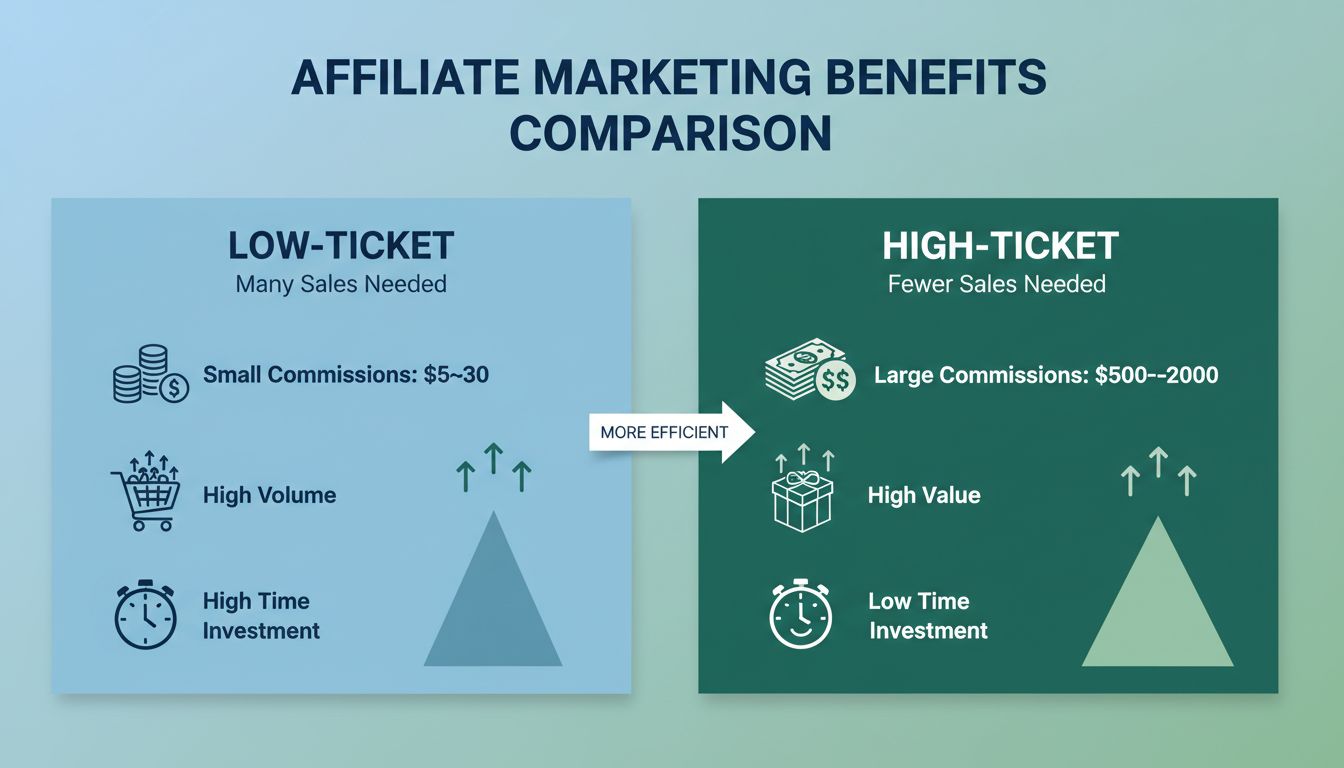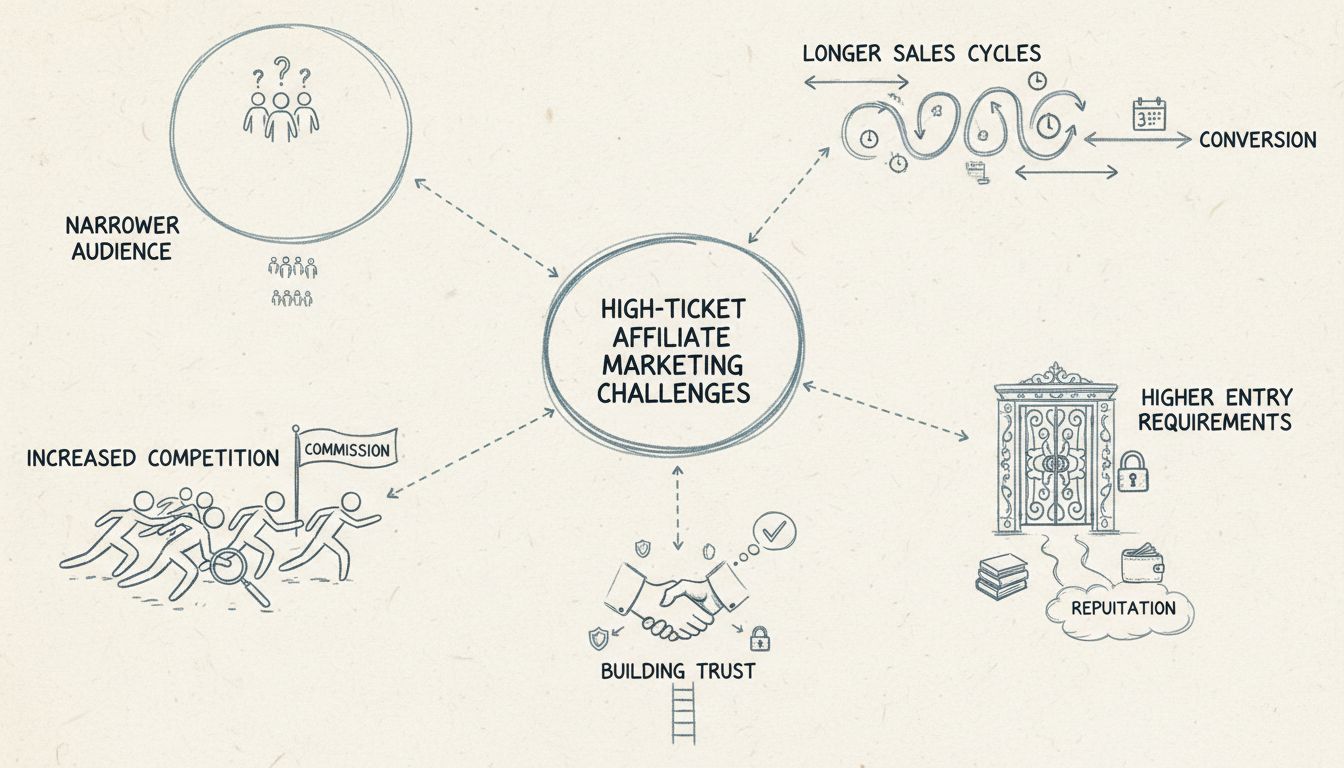
Best High-Ticket Affiliate Programs 2025 - Top Earning Opportunities
Discover the highest-paying affiliate programs in 2025. Compare commission rates, earning potential, and find the best high-ticket affiliate opportunities for y...
A high-ticket affiliate program lets affiliates earn large commissions by promoting high-value products or services, focusing on quality leads for substantial income with fewer sales.
A high-ticket affiliate program is a specific type of affiliate marketing strategy where affiliates focus on promoting products or services that are priced significantly higher than average. This means that the products or services are usually valued at several hundreds to thousands of dollars. As a result, the affiliates earn larger commissions per sale due to the high value of these items. These products often include luxury goods, high-end software, or exclusive membership programs. The commission earned can range from $100 to several thousand dollars per sale, making it a lucrative opportunity for marketers who successfully close these high-value deals.
The success in high-ticket affiliate programs relies on the affiliates’ ability to effectively communicate the value and benefits of the products to potential buyers. This often involves creating compelling marketing content that highlights the unique selling points of the products and addresses any potential objections the buyers might have. Therefore, affiliates need to possess excellent persuasion skills and a deep understanding of their target audience’s needs and preferences.
High-ticket affiliate marketing is a niche within the broader affiliate marketing landscape that focuses specifically on selling high-value products. Unlike traditional affiliate marketing, which typically involves promoting lower-priced items and relies on high volume sales, high-ticket marketing requires fewer sales to achieve substantial earnings. This approach targets a smaller, more niche audience that is interested in premium products. This niche market often consists of discerning buyers who are willing to invest in quality, making it necessary for marketers to tailor their strategies to effectively capture this audience.
High-ticket affiliate marketing demands a more refined approach, as the potential customers are more selective and require in-depth information and reassurance before making a purchase. Affiliates must focus on building trust and establishing authority in their chosen niche to convince these buyers of the product’s value. This often involves providing detailed product reviews, case studies, and testimonials to demonstrate the product’s effectiveness and worth.
Recurring commissions are a significant advantage in high-ticket affiliate programs, especially for services or subscriptions that require ongoing payments. Affiliates benefit from a stable income stream as long as the customer remains subscribed to the service. This model not only provides financial stability but also incentivizes affiliates to maintain customer satisfaction and engagement, ensuring a long-term relationship between the customer and the product or service.
A high-ticket affiliate program is a type of affiliate marketing strategy where affiliates promote products or services with significantly higher prices, earning larger commissions per sale. These often include luxury goods, high-end software, or exclusive memberships.
Benefits include higher commissions, reduced sales volume requirements, recurring income opportunities, enhanced brand trust, and upselling potential with additional features or services.
Challenges include a narrower audience, longer sales cycles, increased competition, and higher entry requirements such as the need for an established online presence.
Yes, examples include Kinsta, Shopify, Liquid Web, Authority Hacker, and HubSpot, all offering substantial commissions for successful referrals.
Start by identifying a niche with high-ticket products, researching reputable programs, developing a targeted marketing strategy, building a strong online presence, and engaging consistently with your audience.
Discover how you can earn more by promoting high-value products and services. Explore top programs and strategies to maximize your affiliate marketing revenue.

Discover the highest-paying affiliate programs in 2025. Compare commission rates, earning potential, and find the best high-ticket affiliate opportunities for y...

Discover the key benefits of high-ticket affiliate programs including higher commissions, reduced sales volume, recurring income, and enhanced brand trust. Lear...

Discover the key challenges in high-ticket affiliate marketing including narrower audiences, longer sales cycles, increased competition, and higher entry requir...
Cookie Consent
We use cookies to enhance your browsing experience and analyze our traffic. See our privacy policy.